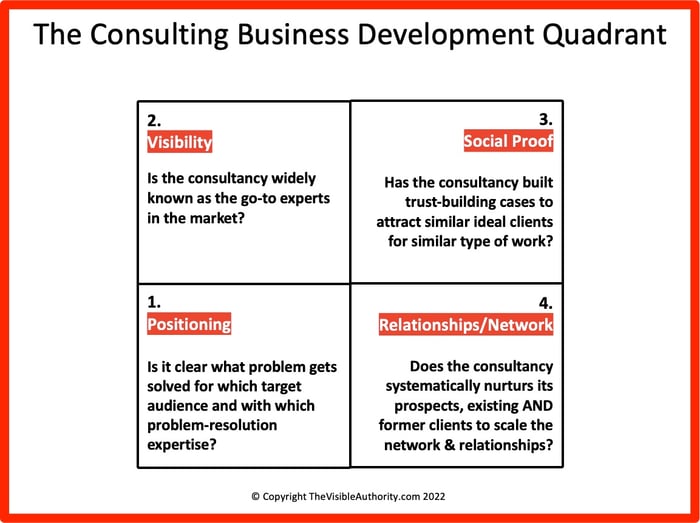
Positioning in Consulting Is an Exercise in Irrelevance and Here’s Why
.jpg?width=56&name=francescorizzato8%20(1280px).jpg)
The title of this article is inspired by David C. Baker, from his awesome book ‘The business of expertise’.
Over the past couple of years, I’ve been working with consultancies on how to leverage their expertise to add value to their clients.
However, the one thing that an overwhelming amount of this work has been coming down to is positioning. It is such an important foundational element that nothing else matters until a consultancy gets this part right.
Marketing and business development strategies will not produce consistent results. The consultancy will play catch-up, trying to win clients by lowering fees and sending dozens of follow-up emails.
I share quite a bit about the importance of positioning through my LinkedIn posts.
Since I tend to focus on one reason at a time, I thought I’d bring a few of the main posts together to help you, my reader, understand and internalize the significance of correctly positioning your consultancy.
What positioning is and isn’t
David C. Baker calls positioning an exercise in irrelevance. Interesting view.
Michael Porter would say, in the spirit of David C. Baker: it’s about deciding what you don’t want to do (to get clear about what you do).
Here’s how I always explain positioning:
Consultancy positioning is the pivotal act of clarifying the problem(s) your consultancy is solving for a specific audience and how your approach is achieving that.
Clumsy consultancy positioning weakens the result of everything you do in marketing, business development, value proposition design, service development, thought leadership, team management, hiring, etc.
Creating a laser-sharp positioning might be the most crucial decision consulting leaders must make. Really.
Most consultancies suffer from a sub-optimal positioning quality, which translates into the target audience or market having no clear idea of what the consultancy exactly does, how it’s done, and why it is of value to them.
Moreover, without a high-quality positioning, there’s no proper framework to organize priorities, client work, educational efforts, and the business development process.
How positioning fits in the larger context of a consultancy’s business development
Positioning is the foundation of everything a consultancy does and how it markets itself.
It’s the ultimate starting point and the framework that needs regular evaluation to ensure it continues to sync with the target audience’s needs.
When working with consultancies, I always use my ‘Business Development Quadrant’ to showcase the 4 areas of business development success.
However, it all starts with positioning in square 1, see the visual below.
If positioning isn’t well defined (in way too many cases, unfortunately), the other business development objectives - growing visibility, building social proof (or trust), and nurturing the relationships/network (to scale it) - will be underperforming.
Here’s the business development quadrant to help you understand how positioning fits in the larger context of your business:

In this business development quadrant, your consultancy should be able to answer the following questions:
- Positioning: Is it clear what problem gets solved for which target audience and with which problem resolution (expertise)?
- Visibility: Is the consultancy widely known and seen as the go-to experts in the market/industry? Does work come directly to the consultancy, reliably and consistently?
- Social Proof: Has the consultancy built referral cases to attract similar ideal clients for a similar type of work?
- Network: Does the consultancy systematically nurture its prospects, existing AND former clients with new findings, cases, experiences, latest trends, technology updates, etc?
Remember: Clumsy consultancy positioning weakens the result of everything you do in marketing, business development, value proposition design, service development, thought leadership, team management, hiring, etc.
Recommended reading: How Consultancies Can Get Started With Value Proposition Design (Without Getting Overwhelmed)
Recession? Why every single consultancy must revisit its positioning right now
In general, I advise consulting leaders to constantly check in on their positioning, its continued relevance, and alignment every quarter or so. And an annual big, foundational review.
Recession? Time to review the consultancy’s positioning.
Ask yourself, do you need to revisit your consultancy’s positioning to determine whether it requires changes due to what’s going on in our world?
Analysis by Bain & Company shows that companies make far more significant gains and losses during recession periods than in normal times. Why? Because some foresee and capitalize on opportunities, while others play defense or get stretched thin.
I know first-hand that this is indeed the case. I started my consultancy at, what some people saw as the most inopportune time – right as the pandemic started. People panicked. Companies panicked. International travel got canceled overnight. I don’t need to remind you what a nightmare it was for all of us on individual and business levels.
Yet, in this time of complete chaos and budget cuts, my consultancy grew. Why? Because I was offering a service that consultants and consultancies were keen to learn – I was teaching how to grow a consultancy in difficult (pandemic) times.
I quickly adjusted my positioning in the context of the pandemic. Contextual finetuning because my expertise didn't change overnight. And so did - contextual adjustments - many other brave and smart consultancies.
So, here’s my message to the reader…
Irrespective of how your consultancy is doing at this very moment, you must revisit your positioning with an eye on the upcoming recession.
What will your target audience look for the most? Which areas of their business will or will not get slashed? What new pain points are going to emerge? Do you need to deepen certain expertise areas and double down on them?
If you position your consultancy right, the upcoming recession can be an attractive growth opportunity.
7 business reasons why a consultancy needs to get its positioning right
#1. A poorly positioned consultancy will always struggle to explain the typical outcomes of its work.
I’ve met my fair share of consultancies in Zoom calls that gave me a 10-minute spiel about what they do. Typically they start listing all their services and talk on autopilot about how unique, experienced, and passionate their firm is.
After 3 minutes, they’ve already ‘lost’ me. My traditional feedback: the prospect doesn’t want to hear this inward-looking, ‘commercial’ consulting gibberish.
The prospect is looking for problem-resolution support and wants to understand what can be achieved with the help of the consultancy.
Prospects are looking for possible OUTCOMES instead of a laundry list of services in the ‘this-is-what-we-do’ style.
Recommended reading: The Single Biggest Mistake Consultancies Make: Talking About Themselves
So stop saying, “Here’s what we do” and start saying, “Here’s what clients typically achieve when working with us.”
That’s an expertise-based, differentiating consulting approach, outcome-led, with a premium pricing vision. And it’s only achievable with strong positioning.
Here’s what I use in my LinkedIn ‘About’ to explain outcomes:
- A crystal clear positioning with a specific value proposition for a well-defined target audience
- A top-of-mind reputation for solving prototypical problems and getting invited as domain authorities
- A substantially higher market/industry visibility, by consistently educating the target audience
- A rock-solid trust-building process through sharing of transformational case studies, validated by former clients
- A much more reliable pipeline of new, premium consulting opportunities, easy to (dis)qualify
"The specialist’s pitch is essentially: ‘We’re experts at helping companies like yours solve problems like yours. We’ve done this before. We do it all the time. We’ve developed a bullet-proof way of doing it”. (Blair Enns)
#2. Without laser-sharp positioning, consultancies struggle to differentiate
Poorly positioned consulting firms have no choice but to compete on pricing. They don’t have any other way of differentiating what they do from hundreds of other firms on the market.
If it’s not crystal clear who the target audience is, what problem(s) can be solved for them, and how expertly the consultancy goes about, you will find yourself in an uphill battle you can never win.
And in the long run, the poorly positioned consultancy will completely exhaust everybody on the team (causing severe consultant retention challenges).
Competing on pricing is toxic in the long run and will erode a consultancy’s reputation and organic growth.
In working with consultancies, these 5 self-assessing questions are part of a positioning exercise that helps to get more explicit about the target audience and its problems to be solved.
As a consulting leader, can you answer these questions about your clients?
- What has changed (over time) in your client’s world that causes the pain points they are confronted with?
- What impact are these changes and pain points causing on your client's everyday work or organization?
- What is the shift your client needs to make to get pain relief?
- What exactly is the consultancy’s expertise that can bring such pain relief?
- What’s the client’s business case for solving these pain points?
- What will/can happen over time if your client isn’t getting into action? What are the potential cost and the risk of inaction?
If you can’t ask these questions straight away, something might be wrong with your positioning. Back to the drawing board.
#3. Strong positioning gets your consultancy into more doors
Say you are at a conference and a prospect asks you what your consultancy does. Can you explain it in 60 seconds?
Here’s what your response should be:
- We are known by [specific audience]...
- for our ability to solve [specific pain point(s)]...
- and deliver [specific outcome(s)]...
- thanks to our [specific approach].
This is how you get a prospect instantly on the hook. In under a minute, you explained why your consultancy is a valuable asset to your target audience. This is how you thrive as a consultancy even in a recession or difficult economic times.
If you can’t explain in 60’, gather the leadership team and go back to the drawing board because a reliable pipeline of easy-to-qualify opportunities is at stake.
And never forget: if it’s easy to explain what the consultancy can achieve, it’ll be much easier to get recommended. Most consultancies underestimate the power of recommendation because of the clarity of positioning.
#4. Multiple positionings, each tailored to its own target audience, deliver stronger results than a single, overly general positioning.
Multiple audiences? Multiple expertise domains? Multiple markets or industries? Well, you will need to run multiple positioning exercises! Yes.
Every audience, expertise domain, and market has its own challenges and pain points.
Consultancies cannot position themselves at the overarching brand level. Positioning always takes place at the level of the pain points of the specific client and the expertise that can help those clients.
Brands don’t solve problems. Expertise does.
Prospects with a problem don’t search for ‘which brand can help me’ (top-down, so to say). They search for a problem resolution. And that takes place at the expertise level (bottom-up, so to speak).
Consulting firms cannot develop the business in an optimal way without a clear decision on who they are, what they do, and for whom they have an unparalleled problem resolution.
With large firms with multiple practices and, as a result, multiple target audiences, each practice should have its own positioning. Think of every practice as its own highly-narrow expertise-driven boutique consultancy. Then develop positioning for that consultancy practice.
#5. Strong positioning helps individual consultants build their personal reputation that further strengthens the consultancy’s reputation
The market is crowded. It’s crowded with consultancies large and small and millions of independent consultants available with a click. Your firm and its consultants will get lost in this noise without a clear message delivered to a specific audience.
Strong positioning gives your consultants a focus and a sense of direction. It helps them understand who they are talking to and how they should go about doing it. This makes their leading thinking more targeted and powerful, which, in turn, helps them build and grow their personal reputation and, by extension, your consultancy’s reputation on the market.
As Roland Gurney (agency marketing expert) brilliantly puts it:
“Positioning is sharpening the axe. Get it right and your messaging, marketing, hiring and growth become much easier.”
#6. Diversification doesn’t protect consultancies from uncertainty. Strong positioning does.
In consulting business development, it’s all about making choices. And that’s exactly what doesn’t happen enough. Consulting leaders tell me: "We have diversified the past years to protect us from economic risk".
Huh.
I was reading this consulting tagline on a website (amongst thousands of others writing the same stuff): "We are consulting at the intersection of strategy, organization, data, and AI".
Yes, this was a real tagline!
I guess they are considering themselves as a nicely diversified consulting firm. That type of positioning (‘we work at the intersection of XYZ’) would be my utter nightmare. I wouldn't know how to explain prototypical project outcomes of such 'an intersection'. Do you know?
I am a big disbeliever in such a so-called 'protection-driven diversification positioning'.
Focus and specialization are much better protection. Way, way better. And way easier to manage. And that can only come from a laser-focused positioning.
A lot of the diversification hassle in consulting firms is just a bloody stupid legacy problem of having added and added and added services in the past because the leaders believe they can make more money and protect them from economic risk by adding more services.
Or they just hired a new partner from yet another expertise domain.
Many of the diversified consulting firms are telling me the ‘risk protection story’ because they weren’t able to focus, or weren’t able to agree on the direction amongst the leaders, heck.
Life in a highly diverse consulting firm is difficult from a business development standpoint. It requires tremendous efforts, including constantly hiring people with all kinds of expertise (not easy today), and it requires a lot of training time for these people. You can be growing on paper, but each step in this growth comes at increasingly unjustified costs (and lower margins).
Based on my experience (and available data), these multi-diverse consultancies are somewhere between 20-50% less profitable compared to a single-focused consultancy.
Shortsighted diversification is a leaking margin bucket.
Don’t believe me? Well, show me a consultancy P&L, and without knowing anything about that consulting firm, I am almost 100% sure I can ‘smell’ it’s either a focused or an unfocused/diversified consulting firm.
Trivial diversification, in almost 90% of the cases, (I repeat myself), is pulling consulting firms into a downstream rate game because they compete on almost everything and rarely have power in the sale as experts.
Why? Because there’s no clear positioning, no target audience with specific pain points to solve, there’s fluffy expertise demonstration (because there’s too much to demonstrate), and the laws of consulting marketing won’t work (building trust and demand at scale).
Not my space.
Recommended reading: Mapping the Journey: The Consultancy Specificity Quadrant
#7. Prospects struggle to get approval for working with poorly positioned consultancies
You probably never really thought about this #7 challenge, right?
Prospects don’t care about your consulting services. They care about their very own new ‘future state’.
And yet, almost every consulting firm is making that mistake: they are positioning themselves with their services. What consulting firms don’t seem to understand is that the prospect will need to pitch internally to get the budget to pay the consultancy’s invoices.
The likelihood this prospect will get the budget by explaining ’I need consulting service X’, is close to zero.
But chances are totally different when the prospect pitches for ‘getting budget to solve pressing problem X and to move to future state Y (or achieve outcomes ABC) with the experienced help of consultancy Z’.
If a consultancy can enable the prospect to do a strong ‘future state pitch’ by showing possible outcomes of the collaboration, such a consultancy will easily outpace the competition.
Armed with a compelling future state narrative (enabled by the consultancy), prospects are more likely to get others on board to get project approval (and the budget).
Likewise, your past clients are more likely to help you generate future business by testifying about similar outcomes from previous projects.
Doesn’t that make you more and more convinced about the power of laser-sharp positioning? And narrow focus?
The good news, the need to update a consultancy’s positioning is often a sign of growth
Be happy, be positive. Positioning reviews and updates are great. I love them. Because it’s a sign of growth, development, reflection, of getting in sync with new evolutions in the market.
Whether it’s because the current positioning is weak or because you’ve outgrown it as a firm, re-working your consultancy’s positioning is making progress. It’s a symptom of taking the consulting business to the next level.
Positioning is never set in stone. On the contrary.
Your consultancy might have been primarily focused on execution-type of work. However, over the years, the consultancy’s expertise has deepened and has achieved a higher altitude of involvement, strategic advisory – upstream-type of work.
The positioning of the consultancy should resemble such a transition: redefinition of the ideal client, client pain points, and problem resolution approach.
I’ve provided 7 solid reasons why positioning should be the #1 priority as a consultancy to grow the business or make it more profitable.
It all comes down to the simple analogy – we can’t build a big, beautiful house on a wobbly foundation and expect it to last. We will always be investing in repairs, upkeeps, and various costly projects until it inevitably crashes.
A consultancy simply can’t afford to waste marketing and business development efforts, hire for the wrong reasons or the wrong people, or waste client generation opportunities.
And this is precisely what’s happening if a consultancy is poorly positioned and is communicating hundreds of incoherent messages to the market.
Recommended reading: A Consultancy's Positioning Has the Single Biggest Impact on the Buying Decision
Interested in receiving all my learnings to become a better consultant? No spam, no BS. Pure teaching! Subscribe to my newsletter.
Frequently Asked Questions
How does one effectively measure the success or failure of a consultancy's positioning strategy? Are there specific metrics or indicators that can be used to evaluate positioning beyond anecdotal evidence or intuition?
Evaluating the effectiveness of a consultancy's positioning strategy requires a multifaceted approach. Metrics such as client acquisition rates, client retention rates, average deal size, and the percentage of qualified leads generated from marketing efforts can provide quantitative insights into the impact of positioning on business outcomes. Additionally, qualitative indicators such as client feedback, market perception surveys, and industry recognition can offer valuable perspectives on how well the consultancy's positioning resonates with its target audience.
Can you elaborate on any common pitfalls or challenges that consulting firms encounter when attempting to refine or adjust their positioning strategies, and provide recommendations for overcoming these obstacles?
Refining or adjusting positioning strategies can indeed present several common challenges for consulting firms. One common pitfall is a lack of clarity or consensus among team members regarding the firm's unique value proposition and target audience. This can result in inconsistent messaging and confusion in the market. Overcoming this challenge often involves conducting thorough internal discussions, market research, and stakeholder interviews to align perspectives and define a cohesive positioning strategy. Additionally, external factors such as evolving market trends or competitive landscape changes may necessitate periodic adjustments to positioning. By staying vigilant and responsive to these dynamics, consulting firms can mitigate potential pitfalls and maintain relevance in their positioning.
You mention the importance of regularly revisiting and potentially updating a consultancy's positioning over time. Could you offer insights into the typical frequency or triggers for conducting these reviews, and provide guidance on how to effectively assess the relevance and effectiveness of existing positioning in evolving market conditions?
The frequency and triggers for conducting positioning reviews may vary depending on factors such as market volatility, changes in client needs, or shifts in industry trends. Typically, consulting firms should consider revisiting their positioning at least annually as part of their strategic planning process. However, significant market disruptions, economic downturns, or shifts in competitive dynamics may warrant more frequent reviews. Additionally, key milestones such as entering new markets, launching new service offerings, or experiencing significant growth or contraction may also signal the need for a positioning reassessment. During these reviews, consulting firms should evaluate the alignment between their current positioning and market demand, solicit feedback from clients and stakeholders, and identify opportunities to refine or adjust their messaging to better resonate with target audiences. By proactively monitoring and adapting their positioning in response to changing market conditions, consulting firms can maintain relevance and competitive advantage over time.
.jpg?width=66&name=francescorizzato8%20(1280px).jpg)
Hello, I’m Luk Smeyers, and I’m helping mid-sized consultancies become high-performing consulting firms. I have been in the consulting businesses for more than 20 years, in very different roles: as European CHRO in a global consultancy, as a founder of a mid-sized analytics consultancy, and as a leader in a 'Big 4' consultancy, post-acquisition of my consultancy. I had the privilege of achieving global visibility as a consulting leader, and I never had to sell, persuade, or negotiate as a result. I have now bundled all those experiences, expertise, know-how, research, reading, successes, struggles, and failures from managing and advising consultancies in the past years.

